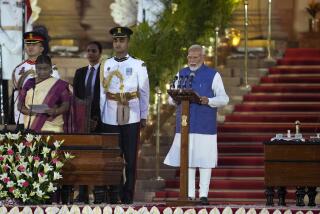Punjab Voters Ignored Threats : His Party Lost but Gandhi Hails Step Toward Unity
- Share via
NEW DELHI — Prime Minister Rajiv Gandhi said Friday that Wednesday’s election in Punjab was a victory for the “unity and integrity of India,” even though his party was soundly defeated.
Akali Dal, the moderate Sikh party, won almost two thirds of the seats in the Punjab assembly and will now control the state, an important one because of its farm production and its strategic location on the border with Pakistan.
The main question at issue in the election was not so much who won but whether the voters would turn out in the face of terrorist threats and a call by Sikh extremists for a boycott. For nearly four years, Punjab has been torn by terrorist violence sparked by extremists seeking an independent homeland for India’s 15 million Sikhs. It had been under direct federal rule for the last two years.
60% Voter Turnout
An estimated 60% of the voters went to the polls, protected by more than 150,000 soldiers and policemen mobilized for the occasion.
Gandhi, in a statement issued Friday, said, “The people of the Punjab have spoken up for democracy, for secularism, for the unity and integrity of India and against separatism and terrorism.”
He said that although his party, the Congress-I, “may have lost the electoral battle . . . it has won the war for India’s unity and integrity, and that was the fundamental aim.”
With some votes still to be counted, it appeared that Akali Dal had won 73 of the 117 seats in the state assembly, the Vidhan Sabha. Under the Indian federal system, the party with a majority of the assembly seats can form a government and name the state’s chief minister and his Cabinet.
Significantly, however, Congress-I candidates won six of the state’s 13 seats in the Lok Sabha, the lower house of the national Parliament, while Akali Dal won seven. That means that many voters split their ballots, voting for the Akali Dal in state races and for the Congress party in national Parliament contests.
The Congress-I apparently won 33 seats in the state assembly, with the others going to minor parties.
Peace Efforts Backed
This vote-splitting is unprecedented, and may indicate that large numbers of people in Punjab approve of Gandhi’s effort to bring peace to the troubled state. On July 24, he had signed an agreement with the Akali Dal leader, Harchand Singh Longowal, meeting many Sikh demands.
Less than a month later, Longowal was assassinated in a Sikh temple by Sikh terrorists. Some of Gandhi’s advisers urged him to postpone the Punjab election, but he decided to go ahead with it, making it a contest between moderate and extremist forces.
The challenge was met by the voters of Punjab, who went to the polls with the sort of enthusiasm that generally characterizes the electoral process throughout India. It was this turnout, in the face of fear and uncertainty, that constituted a victory for Gandhi.
“I thank the brave and patriotic people of Punjab for demonstrating yet again the enduring strength of democratic institutions in India,” he said.
“In one mighty blow, they have crushed the forces that sought to coerce them to opt out of the political mainstream. They have blessed the accord (signed by Gandhi and Longowal). Democracy has won. Nonviolence has won. Bharatmata (Mother India) has won.”
National opposition leaders joined with Gandhi in praising the people of Punjab. Ramakrishna Hegde, the Janata party leader, said that “with these elections I hope a new chapter of peace and prosperity will open in the Punjab.”
Considerable attention had been focused on a rural district near Chandigarh, where the widow of a man who had taken part in the assassination last Oct. 31 of Prime Minister Indira Gandhi was running for the state assembly. The woman, Bimal Kaur Khalsa, the widow of Beant Singh, was put up as an independent candidate, but Sikh extremists supported her in the hope of embarrassing Gandhi. She was narrowly defeated by the Akali Dal candidate.
In Chandigarh, the Punjab capital, the Sikhs moved quickly to organize the state government. Surjit Singh Baranala, a moderate, was named chief minister of the state. He said he expected to see his Cabinet sworn in Sunday and to set about the task of healing the rift caused by years of violence between Sikhs and Hindus. Sikhs are the majority in Punjab.
More to Read
Sign up for Essential California
The most important California stories and recommendations in your inbox every morning.
You may occasionally receive promotional content from the Los Angeles Times.













